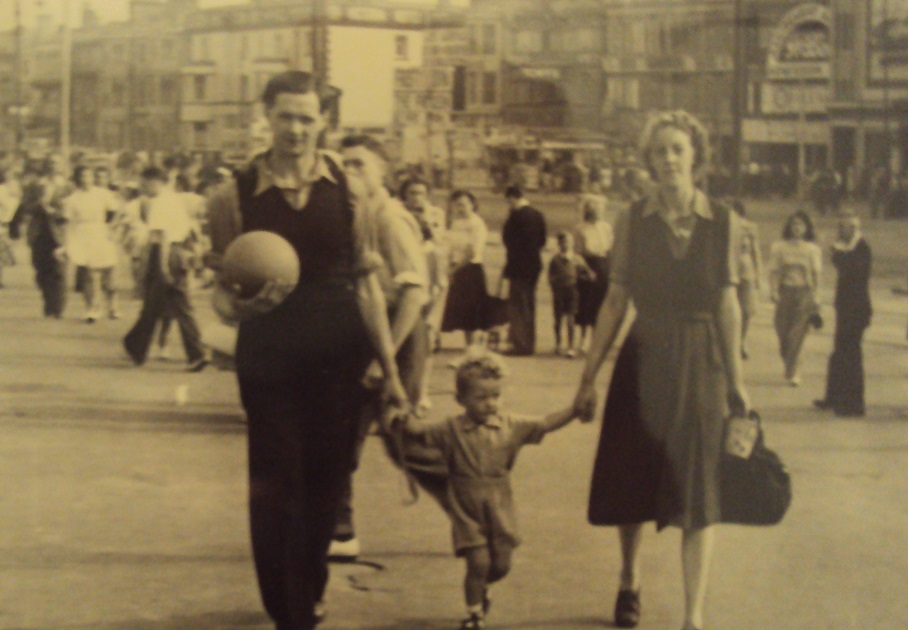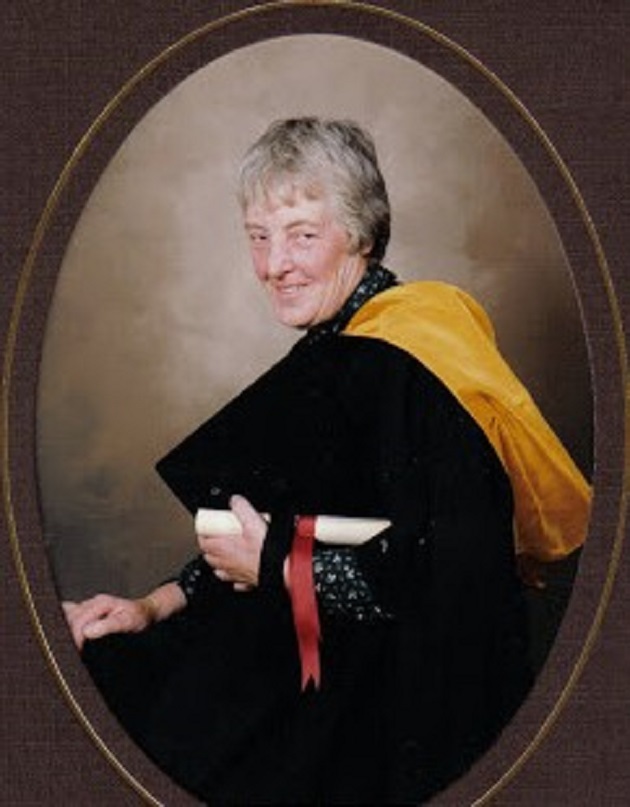| Title | Kathleen Kitchen |
| Date | 1926 – 2013 |
| Location | Rawdon |
| Written By | David Kitchen |
| Comment | The memories shared with us are those of a son for his Mother. Written by David Kitchen on 19th November 2013. |
“Kathleen Kitchen (nee Smith)
Born: 5th June 1926
Died: 15th November 2013
Kathleen Kitchen died this week. She had reached the age of eighty seven years. The last ten had been blighted by illness. The best parts of her life spanned the last three quarters of the twentieth century which was a time of immense social change for women of her background. Kathleen exemplified many of these changes so as somebody obsessed by social history I thought it would be worthwhile giving a brief account of her life for the Aireborough local history website. My view of what was true for her might also be so for many women of her time who grew up in this area.
The Guiseley side of her family had lived close to Town Gate since the beginning of the twentieth century. Her grandfather Arthur Smith who died in the First World War managed nearby Upper End Farm. Her parents Annie and Harold Smith were employed in local mills.
Kathleen attended the church school in the town until she won a competitive scholarship to Aireborough Grammar school when she was eleven years old. The family were extremely short of money and genuinely could not afford the uniform. A decent and well meaning headmaster helped out with second hand school clothes but the embarrassment of this still stung for her sixty years later.
When fourteen a family decision was taken that she should leave school and get a job. The headmaster had said that it was likely that if she completed her secondary education she would get a scholarship for Oxford or Cambridge. There was a fear in the family that by allowing Kathleen to continue at school this would raise her expectations and would end in a bitter disappointment as it would not be possible for them to support her financially through university. She would not have chance to revisit this decision for another three decades.
Kathleen’s first job was at Crompton Parkinson in Guiseley where after a brief spell in the offices she was ‘demoted’ to the factory floor after breaking a very important prototype light fitting by running it along railings when she was asked to deliver it to a senior manager.
She worked there for most of the war years. She and her friends hung out with a group who centred themselves on Harry Ramsden’s and the Hare and Hounds pub. She claimed the pianist at the fish shop Harry Corbett of Sooty and Sweep fame started her smoking. It was probably through him that she met her future husband Rowland Kitchen. He had been a Conscientious Objector during the war. Marrying him was not popular with her friends because of this. They had first met when she was nineteen. They were to be together for the next fifty three years until he died in 1998.They had three sons Ian, Neil and David.
The next twenty years was almost conventional. He worked at Banksfield Dye Works but had a parallel life as a Punch and Judy man, magician and Street Pedlar. She worked in some of the local mills, and as a cleaner at the doctors surgery for what she called rent money. Her social life was Queens Street Methodist Chapel where she was a member of the Young Wives Club. This group of women retained its name and membership for decades! The young wives became middle aged and then old women.
There was lots of hardship though these years early years of family life, and some very good friendships made. Walking around Yeadon Dam in a convoy of prams was a fond memory. Lots of babies were born in the years after the war and the mothers formed bonds that lasted a lifetime. I sent a Christmas card to one such friend on her behalf this year. The lady concerned now lives in Devon.
Kathleen was all the while waiting though. Eventually when she was thirty eight she returned to her interrupted education. She had a plan. To begin with she had to get five GCE ‘O’ Levels and two ‘A’ Levels. This was done by catching the number 35 bus several evenings a week to Leeds where she attended night school.
Once that was achieved the next step was to get into Teacher Training College to do a three year diploma. She was not the typical candidate. By this time aged forty two with three children and the broadest of Yorkshire accents she had to compete with candidates less than half her age. Someone saw her potential though and put ‘Yes’ in the right place on the form. She never got over the astonishment of receiving a study grant from the education department. Being given money to study in itself felt odd but it also meant that she had an income of her own for her own use for the first time in her life.”
The photo says Dad and Mum with Ian.
Across the country people like her in the mid 1960’s were going to university or college. Most were a lot younger and did not have to come home and then take care of children and do housework after a day of studying. She often spoke about the cultural transition she had to crossover at college as being one of the most difficult things in her life. Being comfortable in a classroom, feeling an equal and being taught by people who had no understanding of her background stretched her confidence. Some were encouraging others were quick to predict that she would crash and burn. At one point in her second year she came close to walking out on it all.
After three years at the Bradford Teacher Training College at age forty five she got her first teaching job at a school in Baildon. Not content with a teaching diploma she enrolled for three year course to get a degree in the Psychology of Education. This was three evenings a week at the University in Bradford and every Sunday writing assignments.
She changed schools and became Head of English at Swaine House Middle school in Bradford.
With the degree under the belt and in their late forties most people would have decided after a decade of such intense study it was time to rest on ones laurels. No she enrolled for another course to get a Masters degree in a related subject. This time it might have been less than three years but it was still three evenings a week and every Sunday on top of a working week and a family.
This degree was given to her by Prime Minister Harold Wilson who was chancellor of the Bradford University at the time. As lifelong member of the Labour Party (and despite her dalliances with the Communist Party) Kathleen thought the world of him. He was a man who understood the power of education to change people’s lives. Her mother Annie and eldest son Ian were present at the ceremony. It rained heavily but Wilson who had a streaming cold stood around and talked to every last person.
So what next? She did consider going for a doctorate and I am sure she would have given it the same focus that she had given everything from first ‘O’ Level onwards.
She changed tack though and took up traveling. Over the next few years she visited Bermuda, South Africa, Swaziland, Italy, Spain and every corner of Britain. Underpinning every trip was self education.
She is one of the very few people I have known who loved education and learning for its own sake. I know she would walk a hundred miles to see a Shakespeare play or attend a course on Thomas Hardy and the enjoyment would be written all over her face.
She retired from teaching at age sixty seven and if truth be known was then a bit lost. One story from this time exemplifies her approach to life and teaching though. Ian and she were walking through one of the rougher parts of Bradford. Ian saw ahead of them a group of intimidating adolescents cross the street and walk towards them. He feared the worse but all they wanted to do was walk over and give her a hug. They were former pupils who held her in affection. They were lads who had not done well at school but they knew that she had done her best and had never given up on them.
Towards the end of her life but before she became ill I asked if she had regrets about not going to university in her twenties. We both knew she could have gone very far and I imagined that missing out had been torture .Her answer was that the way she had done it was the better one. She learned about her subject, the psychology of education at a time when life experience had given her insights to appreciate it.
The two decades of the sixties and seventies were a truly transformative time for people in Aireborough and elsewhere whose ancestors had left school in their early teens and had largely had their potentials ignored.
Equality of opportunity has now lost some of its resonance but for people like Kathleen it was something so important. That ethos and the changes in our society from the 1960’s onwards made so much possible for people like her.”
David Kitchen.
19th November 2013.
Consolidated by Jack Brayshaw. 01 September 2022.
Last updated: 01 September 2022.



